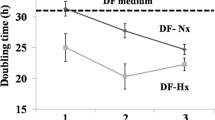Abstract
Angiogenesis and coronary artery collateral formation can improve blood flow and thereby prevent myocardial ischemia. The role of perivascular fibroblasts in neovascularization remains incompletely understood. Here we investigated the effects of epicardial and myocardial fibroblasts on angiogenesis in vitro by using a serum-free microcarrier-based fibrin gel angiogenesis system. To clearly distinguish between different cell types, we either stained endothelial cells or fibroblasts in the living with 1,1′-dioctadecyl-3,3,3′,3′-tetramethyl-indocarbocyanine-perchlorate (DiI). In cocultures, low numbers of heart fibroblasts stimulated endothelial sprouting, and capillary growth was also induced by fibroblast-conditioned media, indicating a paracrine mechanism. Capillary formation was decreased by increasing the density of fibroblasts in the cocultures, indicating contact-dependent inhibition. Using time-lapse studies, it turned out that close contacts between fibroblasts and endothelial cells resulted in rapid retraction of endothelial cells or, rarely, in cell death. Depending on the local ratio of fibroblasts to endothelial cell numbers, fibroblasts determined the location of capillary growth and the size of developing capillaries and thereby contributed to capillary network remodeling. In contrast to primary heart fibroblasts, NIH 3T3 fibroblasts did not display contact-dependent inhibition of endothelial sprouts. NIH fibroblasts were frequently seen in close association with endothelial capillaries, resembling pericytes. Contact-dependent inhibition of angiogenesis by epicardial fibroblasts could not be reversed by addition of neutralizing anti-TGF-β1 antibodies, by addition of serum, of medium conditioned by hypoxic tumor cells or myocardium, by various cytokines or by growing cocultures under hypoxic conditions. Our results implicate a pivotal role of periendothelial mesenchymal cells for the regulation of microvascular network remodeling and collateral formation.
Similar content being viewed by others
Author information
Authors and Affiliations
Additional information
Received: 15 September 1997 / Accepted: 6 April 1998
Rights and permissions
About this article
Cite this article
Nehls, V., Herrmann, R., Hühnken, M. et al. Contact-dependent inhibition of angiogenesis by cardiac fibroblasts in three-dimensional fibrin gels in vitro: implications for microvascular network remodeling and coronary collateral formation. Cell Tissue Res 293, 479–488 (1998). https://doi.org/10.1007/s004410051140
Issue Date:
DOI: https://doi.org/10.1007/s004410051140




